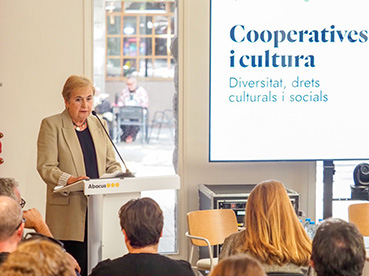The Catalan cooperative Abacus hosted on September 26 the event “Cooperatives and Culture: Diversity, Cultural and Social Rights,” held within the framework of UNESCO’s World Conference on Cultural Policies and Sustainable Development (Mondiacult 2025). The meeting, organized by the International Cooperative Alliance (ICA) in collaboration with CICOPA, Abacus, and the Arizmendiarrieta Social Economy Think Tank (ASETT), highlighted cooperativism as a key cultural agent and an essential pillar in building a more inclusive and sustainable future.
The event was part of a broad campaign to position cooperatives in global debates and programs that present culture as an inseparable component of sustainable development, while also strengthening the work of the ICA Working Group on Cooperative Cultural Heritage.
Abacus President Maravillas Rojo opened the event by recalling that cooperativism “is a living movement with deep historical roots and a future full of promise,” demonstrating its ability to address “urgent challenges such as democratic polarization, climate change, and inequality.” Along the same lines, Nadia Quevedo, Commissioner for Economic Promotion of the Barcelona City Council, emphasized that the city “aspires to be a cooperative capital in the cultural sphere, capable of attracting initiatives that connect people and strengthen democracy.”
The debate was enriched by the intervention of Iñigo Albizuri, ICA Board member and Director of ASETT, who defended cultural diversity and the use of minority languages in global spaces, stressing that “from books to factories, everything can be done cooperatively.” Ariel Guarco, ICA President, also highlighted cooperatives as solutions for protecting cultural heritage, while Simel Esim, Head of the ILO’s Cooperative, Social and Solidarity Economy Unit, called for integrating cooperatives into cultural policies as enterprises “based on international labor standards and inspired by the wisdom of peoples.”
Culture and social transformation
The second session, moderated by Víctor Meseguer, Deputy Director General of Abacus, focused on the role of cultural cooperatives in social transformation. Giuseppe Guerini, President of Cooperatives Europe, highlighted the strength of cooperative culture as a democratic and transformative engine, “the best antidote to predatory capitalism.”
Also participating were Laia Bonastra, President of the Federació de Cooperatives de Treball de Catalunya; Giovanna Barni, President of CulTurMedia Lega Coop; Patxi Olabarria, President of the Superior Council of Cooperatives of Euskadi; and Heloísa Lopes, Vice President of Sicredi Pioneira, who reminded that education, culture, and community are inseparable, and that cooperation is the means to empower people in these essential spheres.
Liz McIvor, Director of the Cooperative Heritage Trust, and Marta Lozano, President of WazoCoop (Extremadura), also stressed the importance of working with communities and rural territories to strengthen cooperation and sustainable development.
The post-2030 agenda
The third segment, focused on the post-2030 agenda, brought together institutional and international representatives. David Bonvehí, Director General of Cooperatives of the Catalan Government, underlined the role of cooperatives in preserving languages, heritage, and cultural identity, noting that they are “seeds of cultural participation” with an impact on public policy. Jokin Díaz, from the Basque Country, emphasized that its cooperative tradition combines entrepreneurship, industry, and culture with strong social economy policies, generating employment and tangible impact.
At the international level, Sébastien Vauzelle (UN) advocated aligning cooperativism with the SDGs; Osamu Nakano (Japan) supported intergenerational cooperation; and P. Santosh Kumar (India) reminded that “identity is the sum of our experiences.”
In closing, Diana Dovgan, Secretary General of the ICA’s Sectoral Organization for Industrial and Service Cooperatives (Belgium), and Francesca Martinelli (Italy), Director of the Centro Studi Doc Foundation and ICA rapporteur in Italy, agreed on the need to consolidate cooperativism as a global cultural and social engine.
“Today’s message is clear: cultural rights, diversity, and decent work go hand in hand. Cooperatives embody this convergence. They show that democracy in the workplace fosters diversity, and that solidarity and democratic governance strengthen cultural freedom,” they emphasized.







